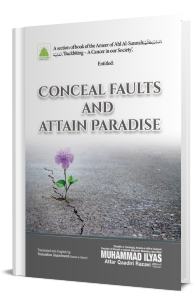
Islamic Life
Concealing Faults
Abu Wasif Attari Madani
Humans have an incredible ability to do immense good or great evil. Although we all have the potential for good and bad, some people prefer to focus on the bad of others, overlooking their good. They are akin to flies which prefer to sit on impure wounds instead of the rest of the body. Such unfortunate souls waste their time and efforts in search of people’s hidden shortcomings in a bid to expose them.
Such phrases are uttered by them:
* "Hey, did you hear about him and his big fight with his wife yesterday.”
* “She was humiliated by her landlord.”
* “He is very timid, yesterday when a rat came to his house, he ran out onto the street in fear.”
* “He is very greedy.”
* “His child is below average in school and is always getting in trouble.”
* “She does not get along with her mother-in-law, just yesterday they had a massive quarrel.”
* “He went to her house with a marriage proposal but was humiliated and thrown out by the family.”
They get a strange, devilish pleasure by doing this and become blind to their own evils.
This type of malicious behaviour entails two sins: One, the evil act seeking out the faults of others, which has been forbidden in the noble Quran where it states:
وَّ لَا تَجَسَّسُوۡا
“And do not search for (hidden) faults.”[1]
Two, the evil and despicable act of publicising people’s shortcomings. The final Messenger of Allah صَلَّى الـلّٰـهُ عَلَيْهِ وَاٰلِهٖ وَسَلَّم said, "Whosoever seeks the faults of his Muslim brother, Allah Almighty will reveal his faults, and whosoever’s faults Allah Almighty will reveal, he will be humiliated even whilst in ˹his˺ house.”[2]
Commenting on this hadith, Mufti Ahmad Yar Khan رَحْمَةُ الـلّٰـهِ عَلَيْه states, “The divine order dictates that whosoever defames someone without reason, Allah Almighty will defame him.”[3]
Sins were observed falling
Once, the foremost Imam, the Master of the Jurists, Imam Abū Ḥanīfaرَحْمَةُ الـلّٰـهِ عَلَيْهwent to the wudu area of Jami Masjid Kufa. He saw a young man performing wudu and the drops of used wudu water were dripping from him. He رَحْمَةُ الـلّٰـهِ عَلَيْه said, “Dear son! Repent for ˹the sin of˺ disobeying your parents.” “I have repented,” he replied. Seeing the drops of water falling from another person, heرَحْمَةُ الـلّٰـهِ عَلَيْهsaid, “My brother, repent for ˹the sin of˺ fornicating.” “I have repented,” he humbly replied. Seeing the remnants of water falling from another person, the Imam said, “Repent for ˹the sin of˺ drinking wine and listening to songs and music.” He humbly replied, “I have repented.”
As the shortcomings of people would manifest before him, Imam Abū Ḥanīfa asked Allah Almighty to end these unveilings of the unseen. His supplication was accepted and the unveilings ceased.[4]
Learning of people’s sins was a bête noire of the great men and women of Allah, let alone publicising them. If we happen to learn of someone’s sins or faults, we should conceal them, as long as doing so does not infringe on the rights or safety of others. The beloved Prophet صَلَّى الـلّٰـهُ عَلَيْهِ وَاٰلِهٖ وَسَلَّم said, “Whosoever conceals the faults of a Muslim, Allah Almighty will conceal his faults in the world and the Hereafter.”[5]
It is narrated in Mirat al-Manajih:
Do not reveal hidden shortcomings, provided that this does not harm the religion or the nation, otherwise they must be revealed! Capture the spies of the disbelievers! Expose the plans of those who secretly plot! Inform the oppressed about the plot of the one who plans to murder out of oppression! Conduct is one thing, transactions and politics are different things.[6]














Comments